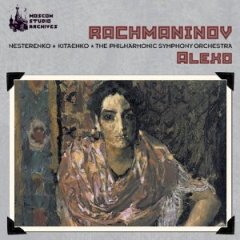Sergei Rachmaninov – Aleko (2005)
Sergei Rachmaninov – Aleko (2005)

1. Aleko, opera, TN II/70: Introduction 2. Aleko, opera, TN II/70: Chorus 3. Aleko, opera, TN II/70: The Old Man's Story 4. Aleko, opera, TN II/70: Scene and Chorus 5. Aleko, opera, TN II/70: Women's Dance 6. Aleko, opera, TN II/70: Men's Dance 7. Aleko, opera, TN II/70: Chorus 8. Aleko, opera, TN II/70: Duettino 9. Aleko, opera, TN II/70: Scene at the Cradle 10. Aleko, opera, TN II/70: Aleko's Cavatina play 11. Aleko, opera, TN II/70: Intermezzo 12. Aleko, opera, TN II/70: The Young Gypsy's Romance 13. Aleko, opera, TN II/70: Duet and Finale Evgeni Nesterenko, bass Alexander Fedin, tenor Vladimir Matorin, bass Svetlana Volkova, soprano Raise Kotova,mezzo-soprano Moscow Philharmonic Symphony Orchestra Dimitri Kitaenko – conductor
Aleko was Sergei Rachmaninov’s first opera, and his earliest success. He composed the one-act melodrama in 1892 at the age of 19 in less than three weeks, and was awarded the Moscow Conservatory’s Gold Prize. Even more importantly, perhaps, the vocal score was published and a first performance arranged at Moscow’s prestigious Bolshoi Theater, where it shared a double bill with Tchaikovsky’s Iolanta at the elder composer’s insistence. In 1897, Aleko was premiered in St Petersburg, the title role being taken by the famous bass Feodor Chaliapin. Chaliapin would go on to record the cavatina, endearing it to generations of record collectors. Russian bass Evgeni Nesterenko joined the roster of Moscow’s famed Bolshoi Opera in 1971. He has taken on all of the major Russian bass roles and has recorded widely. In 1976, Dmitri Kitaenko was named chief conductor of the Moscow Philharmonic Symphony Orchestra, a position he held until 1990, when he left Russia for the West. ---Editorial Reviews
I've never really gotten into Russian opera. Is it the language? The musical style? I don't know...but this is wonderful. It's short and it's tuneful. This is early Rachmaninoff and it is very Romantic...similar to the Second Piano Concerto, although the tunes aren't as good. Maybe it would be more accurate to say it's similar to a tone poem like "The Rock" or "Prince Rostislav". If you know those pieces and like them, I think you will like this. The big climaxes are very exciting and the orchestral music in the opera is quite beautiful. ---Jeffrey Harris, amazon.com
Synopsis: A band of gypsies has pitched its tents for the night on the bank of a river. Beneath a pale moon, they light campfires, prepare a meal and sing of the freedom of their nomadic existence. An old gypsy tells a story. Long ago, he loved Mariula who deserted him for another man, leaving behind Zemfira, their daughter. Zemfira is now grown up, has her own child, and lives with Aleko, a Russian who has abandoned civilisation for the gypsy life. Hearing this story, Aleko is outraged that Zemfira’s father took no revenge on Mariula. But Zemfira disagrees. For her, as for her mother, love is free, and she herself has already tired of Aleko’s possessiveness and now loves a younger gypsy, one of her own people. After dances for the women and the men, the gypsies settle down to sleep. Zemfira appears with her young lover, whom she kisses passionately before disappearing into her own tent to look after her child. Aleko enters and Zemfira taunts him, singing about her wild lover. Alone, Aleko broods on the catastrophe of his relationship with Zemfira and the failure of his attempt to flee the ordinary world. As dawn comes, he surprises Zemfira and her lover together. In a torment of jealousy he kills them both. All the gypsies gather, disturbed by the noise. Led by Zemfira’s father, they spare Aleko’s life but cast him out from them for ever.
download: uploaded yandex 4shared mediafire solidfiles mega filecloudio nornar ziddu
Zmieniony (Sobota, 29 Marzec 2014 16:27)








